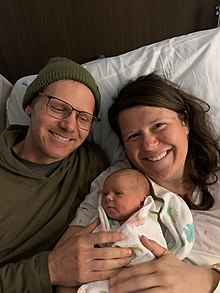
Parenting or child rearing promotes and supports the physical, cognitive, social, emotional, and educational development from infancy to adulthood. Parenting refers to the intricacies of raising a child and not exclusively for a biological relationship.[1]
The most common caretakers in parenting are the biological parents of the child in question. However, a caretaker may be an older sibling, step-parent, grandparent, legal guardian, aunt, uncle, other family members, or a family friend.[2] Governments and society may also have a role in child-rearing or upbringing. In many cases, orphaned or abandoned children receive parental care from non-parent or non-blood relations. Others may be adopted, raised in foster care, or placed in an orphanage. Parenting skills vary, and a parent or surrogate with good parenting skills may be referred to as a good parent.[3]
Parenting styles vary by historical period, race/ethnicity, social class, preference, and a few other social features.[4] Additionally, research supports that parental history, both in terms of attachments of varying quality and parental psychopathology, particularly in the wake of adverse experiences, can strongly influence parental sensitivity and child outcomes.[5][6][7] Parenting may have long-term impacts on adoptive children as well, as recent research has shown that warm adoptive parenting reduces internalizing and externalizing problems of the adoptive children over time.[8]
- ^ Jane B. Brooks (28 September 2012). The Process of Parenting: Ninth Edition. McGraw-Hill Higher Education. ISBN 978-0-07-746918-4. For the legal definition of parenting and parenthood see: Haim Abraham, A Family Is What You Make It? Legal Recognition and Regulation of Multiple Parents (2017)
- ^ Bernstein, Robert (20 February 2008). "Majority of Children Live With Two Biological Parents". Archived from the original on 20 April 2008. Retrieved 26 March 2009.
- ^ Johri, Ashish (2 March 2014). "6 Steps for Parents So Your Child is Successful". humanenrich.com. Retrieved 2 March 2014.
- ^ JON., WITT (2017). SOC 2018 (5TH ed.). [S.l.]: McGraw-Hill. ISBN 978-1-259-70272-3. OCLC 968304061.
- ^ Schechter, D.S., & Willheim, E. (2009). Disturbances of attachment and parental psychopathology in early childhood. Infant and Early Childhood Mental Health Issue. Child and Adolescent Psychiatry Clinics of North America, 18(3), 665-87.
- ^ Grienenberger, J., Kelly, K. & Slade, A. (2005). Maternal Reflective Functioning, Mother-Infant Affective Communication and Infant Attachment: Exploring The Link Between Mental States and Observed Caregiving. Attachment and Human Development, 7, 299-311.
- ^ Lieberman, A.F.; Padrón, E.; Van Horn, P.; Harris, W.W. (2005). "Angels in the nursery: The intergenerational transmission of benevolent parental influences". Infant Ment. Health J. 26 (6): 504–20. CiteSeerX 10.1.1.964.1341. doi:10.1002/imhj.20071. PMID 28682485.
- ^ Amy L. Paine, Oliver Perra, Rebecca Anthony, and Katherine H. Shelton (August 2021). "Charting the trajectories of adopted children's emotional and behavioral problems: The impact of early adversity and postadoptive parental warmth". Development and Psychopathology. 33 (3): 922–936. doi:10.1017/S0954579420000231. PMC 8374623. PMID 32366341.
{{cite journal}}: CS1 maint: multiple names: authors list (link)